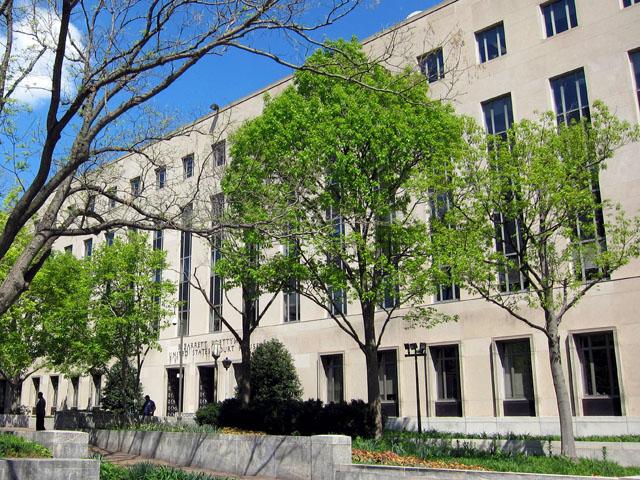Ethanol Group Argues SREs Before Court
Growth Energy Attorney Outlines Group's Strategy on Renewable Fuel Standard
OMAHA (DTN) -- EPA failed to reallocate biofuel gallons lost to small-refinery exemptions in the 2019 Renewable Fuel Standard volumes, an attorney for Growth Energy argued in an ongoing lawsuit before a federal appeals court on Friday. The attorney asked the court to provide direction to EPA on the issue.
Growth Energy filed a lawsuit in the U.S. Court of Appeals for the District of Columbia Circuit on Feb. 4, 2019. Between 2016 and 2018, EPA granted 85 exemptions, totaling about 4 billion gallons in lost biofuels demand.
Growth Energy Counsel David Lehn asked the three-judge panel on Friday to direct EPA to reallocate the gallons from exemptions granted in 2018.
The agency granted 31 small-refinery exemptions in 2018, totaling about 1.4 billion gallons in biofuels demand.
"I just wanted to be clear that, should the court agree with us, that EPA did need to adjust the standards to account for the exemptions, that it's imperative that the court direct EPA to actually do that on remand," he said during arguments.
In a 2016 Americans for Clean Energy case, the court ruled EPA invalidly waived 500 million gallons from the RFS. "Three years later, the EPA is still done nothing to remedy that," Lehn said.
"But I think it's the same situation here where EPA set a lower-than-permitted standard. We're always going to have this problem on remand that there's going to be a makeup in the future. That has to be permissible, otherwise, judicial review will be meaningless. So, I think it's imperative that the court provides some guidance and direction to actually remedy."
Lehn told the court EPA needs to adjust future standards to account for "the exemptions that it disregarded in setting the volume requirements."
P[L1] D[0x0] M[300x250] OOP[F] ADUNIT[] T[]
As part of the oral arguments on Friday, the court also was considering whether the legal challenge is timely since the exemptions at the center of the case were granted back to 2018.
During a press call following the court arguments, Growth Energy General Counsel Kakesh said the court likely will decide the case at the end of the year or early next year.
Several lawsuits were filed when the ethanol industry caught wind EPA granted an unprecedented number of small-refinery exemptions from 2016 to 2018.
SIX CASES PENDING
In addition to the case argued on Friday, there are six other SRE cases pending in the D.C. appeals and district courts.
Growth Energy CEO Emily Skor said during a press briefing that last week's EPA denial of 54 gap-year exemption requests was just one step to restoring the RFS.
"Good stuff, good solid stuff, but we still have a lot more work to do," she said. "And, you know, for us, litigation, unfortunately, is a very important tool in the box that we have to use to put an end to the demand destruction once and for all. You know, for us, this remains incredibly important, which is why we are pursuing the litigation."
Kakesh said that how the court rules on this case could affect the 2020 standards. Growth Energy also is part of litigation on the 2020 standards.
"Where the 2020 RVO rule is different is in its projection of future gallons," he said. "Both rulemakings treat backward-looking retroactive exemptions the same with respect to if there is a shortfall and so forth. That is an important question that EPA has not given us any information on -- what we're going to do -- and this is part of our overall challenge with the agency -- the lack of transparency, a lack of clarity on policy -- that we want to continue to press them on."
Kakesh said the various lawsuits are part of an overall legal strategy on the small-refinery exemptions program. That includes challenging the agency on the validity of granting the exemptions themselves, EPA's "failure" to make up for lost gallons to the RFS, and the agency's "secrecy" of the exemptions process.
"So, let's be real clear about terminology here," he said. "When I talk about a 'retroactive SRE,' I'm not just talking about an SRE that occurred. I'm talking about any SRE that EPA grants after it establishes in RVO for a particular year. So, when EPA is setting RVO, it can project what it thinks will be future retroactive SREs, but it also already has evidence. It actually has already been granted. So, our lawsuit really pushes both of those types of SREs."
ENVIRONMENTAL CHALLENGE
Also during the oral arguments on Friday, the court heard from attorneys for environmental groups that have alleged the EPA has not taken the Endangered Species Act into account when setting the 2019 RVO.
In addition, oil industry petitioners are challenging EPA for not exercising waiver authority to reduce overall biofuel volumes in 2019.
"So, some environmental petitioners said that EPA was obligated under the ESA to consult with an agency because of the potential effects that the RVO may have on protected species endangered or threatened species," Kakesh said.
"The environmental challenges here have not presented evidence showing causation, that the establishment of an RVO causes or effects endangered species," Kakesh said. "And the reason for that is, it doesn't obligate farmers to do anything. It only obligates refiners to blend. So, there are a number of decisions that farmers and other folks involved in the production chain of biofuels make that are not governed by a particular RVO standard."
Todd Neeley can be reached at todd.neeley@dtn.com
Follow him on Twitter @toddneeleyDTN
(c) Copyright 2020 DTN, LLC. All rights reserved.




